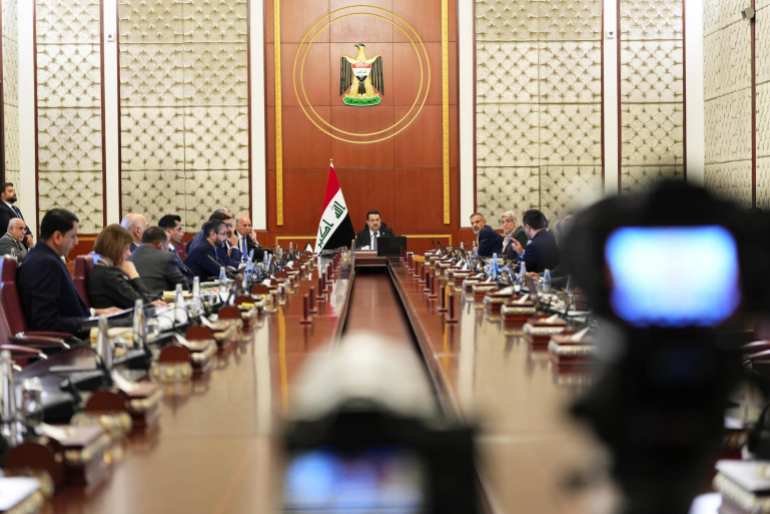Baghdad- In recent days, there has been growing talk of a possible cabinet reshuffle in the government of Iraqi Prime Minister Muhammad Shia al-Sudani, as part of his commitment to evaluate the performance of ministers based on an approved program by the government more than a year ago.
During a council of ministers on October 29, Al-Sudani announced his intention to make an amendment on the occasion of the second anniversary of the formation of the government, thus raising questions about his political orientation, especially that it comes a year before the next legislative elections.
He said in his statements: “The ministerial reshuffle is not a political position with regard to this bloc or this party, but rather a desire to achieve more effective performance to meet the demands on the ground and the aspirations of citizens”, adding that “the government’s success rate reached 62%, and successes were achieved in important and important files, and they faced “difficulties in other files, and we been delayed in some details”.
However, Al-Sudani did not reveal the names of the ministers proposed for replacement, which increased doubts about the real reasons for this amendment.

The role of Parliament
Furthermore, Member of the House of Representatives, Suhaila Al-Sultani, confirmed that Parliament will not tolerate any defect or negligence affecting the work or performance of a minister or government official. She told Al Jazeera Net that Parliament plays a crucial role in monitoring the performance of civil servants and handling any hesitation firmly and seriously.
She explained that when voting on the current government, the fundamental condition was that there were evaluations of the work of ministers, directors general and agents, emphasizing that Parliament refuses to abandon this role.
On November 27, the Iraqi Council of Representatives approved the ministerial program of the Sudanese government before it took office, and it included a working document composed of two axes: The first is executive and the second is linked to the legislation.
According to Al-Sultani, Parliament monitors the performance of state officials and any shortcomings brought to the attention of citizens, representatives or the prime minister are dealt with firmly. She confirmed that Parliament provides the Prime Minister with all the information it has on the officials in its government team and that it will interact positively with the Prime Minister’s decision when presenting any civil servant suffering from a lack of performance.
For his part, member of the House of Representatives, Muhammad Al-Baldawi, confirmed that the legislative authority monitors cases of imbalance and evaluates the performance of institutions. He explained – to Al Jazeera Net – that the ministerial assessment is the work of the government and the competence of its president, and that it is he who will decide whether an amendment is necessary or not.
Impossible
It is worth noting that in April 2023, Al-Sudani indicated – for the first time – his intention to carry out a cabinet reshuffle within his government, emphasizing that it would be “at the appropriate time”. He added at the time: “We deal with ministers in a clear and frank manner regarding the professional assessment of their work, and the constitution gives the prime minister the power to remove a negligent minister.”
According to his statements, there was an initial period of 6 months to review the performance of ministers and assess the degree of their commitment to the tasks assigned to them, with the possibility of changing any official who did not achieve the required objectives. .
Representative Al-Baldawi continued that the responsibility is symbiotic between the Prime Minister and the ministers in the implementation of what is indicated in the school curriculum and the government program of each ministry and institution, stressing that the ministers bear the responsibility. responsibility.
For his part, the director of the Al-Rafd Studies Center, Abbas Al-Jubouri, believes that the option of a ministerial reshuffle by the Prime Minister is impossible at present, “because all the ministers have been chosen by the political blocs which control the political balance within the country.
Al-Jubouri told Al Jazeera Net that this issue can only take place during legal interrogations in the House of Representatives, adding that any minister or official whose work is classified as deficient must be questioned in the House, and if he is not satisfied with his answers, he will be fired and someone else will be appointed.
Political balances
According to Al-Jubouri, pressures, political balances and quotas prevent the replacement of any minister or official until the end of the stage, and there will be no change and the government will remain as it is until the end of the stage. ‘at the end of his mandate. in 2025 and the holding of elections.
The next date of elections to the Iraqi Parliament is considered a fixed constitutional right, as it is determined based on Article 62 of the Constitution, which states that general elections must be held 4 years after the first session of the House representatives, with 45 days. removed from this period. The date is therefore October 25 every 4 years.
For his part, political scientist Ali Al-Mutairi suggested that the amendment would include 4 to 5 ministers, saying that “reluctance” in the work of several ministries had been diagnosed. According to him, “it is the political blocs which obstruct the change of ministers, around which there are problems and question marks.”
Al-Mutairi added – on Al-Jazeera Net – that Al-Sudani, during the first 100 days of his rule, was committed to making changes, but “unfortunately, he could not achieve results in this regard”, emphasizing that importance of the pressure of the Prime Minister to change the ministers on whom observations were recorded by him and the political blocs to end this ongoing controversy.
